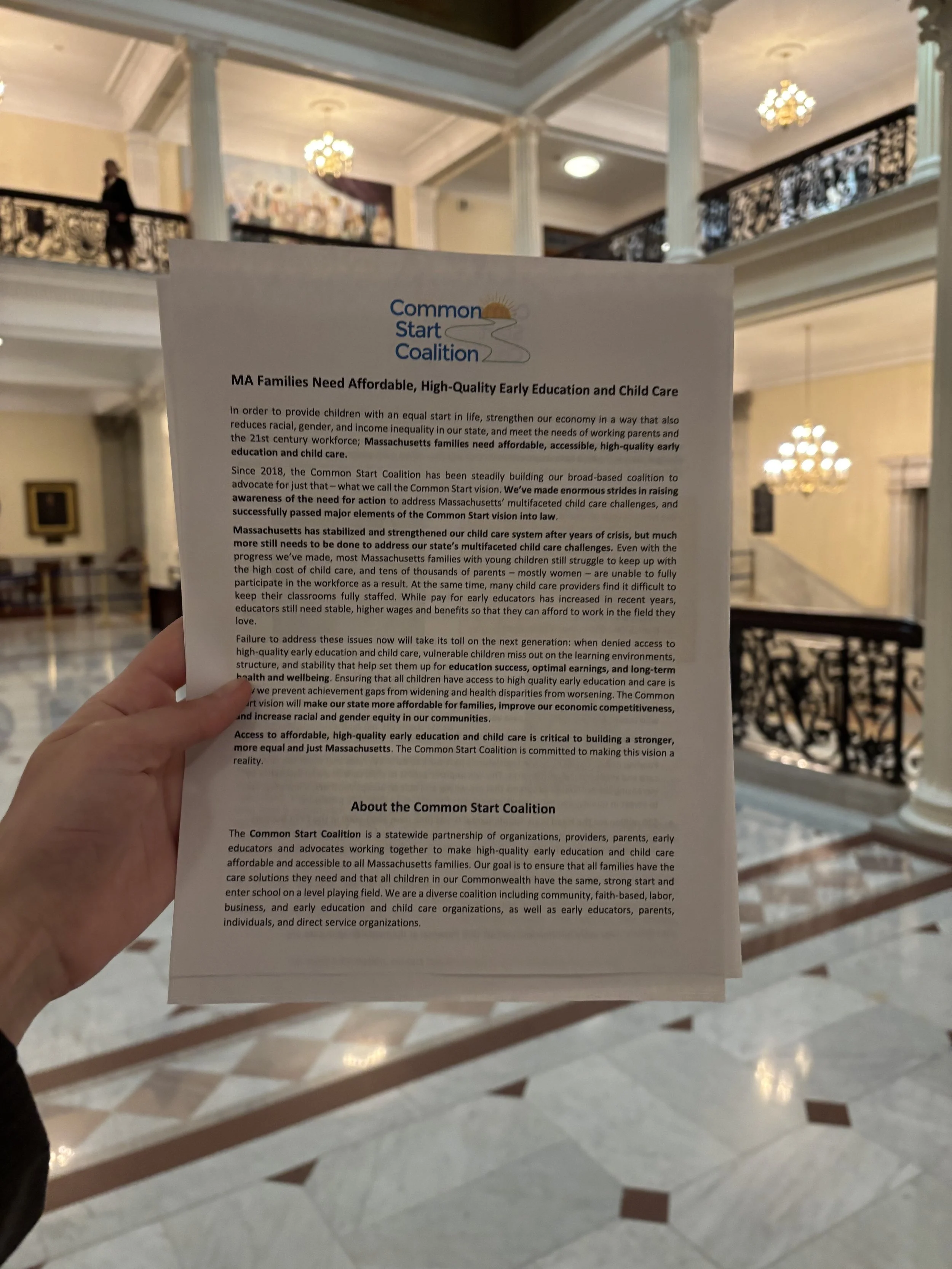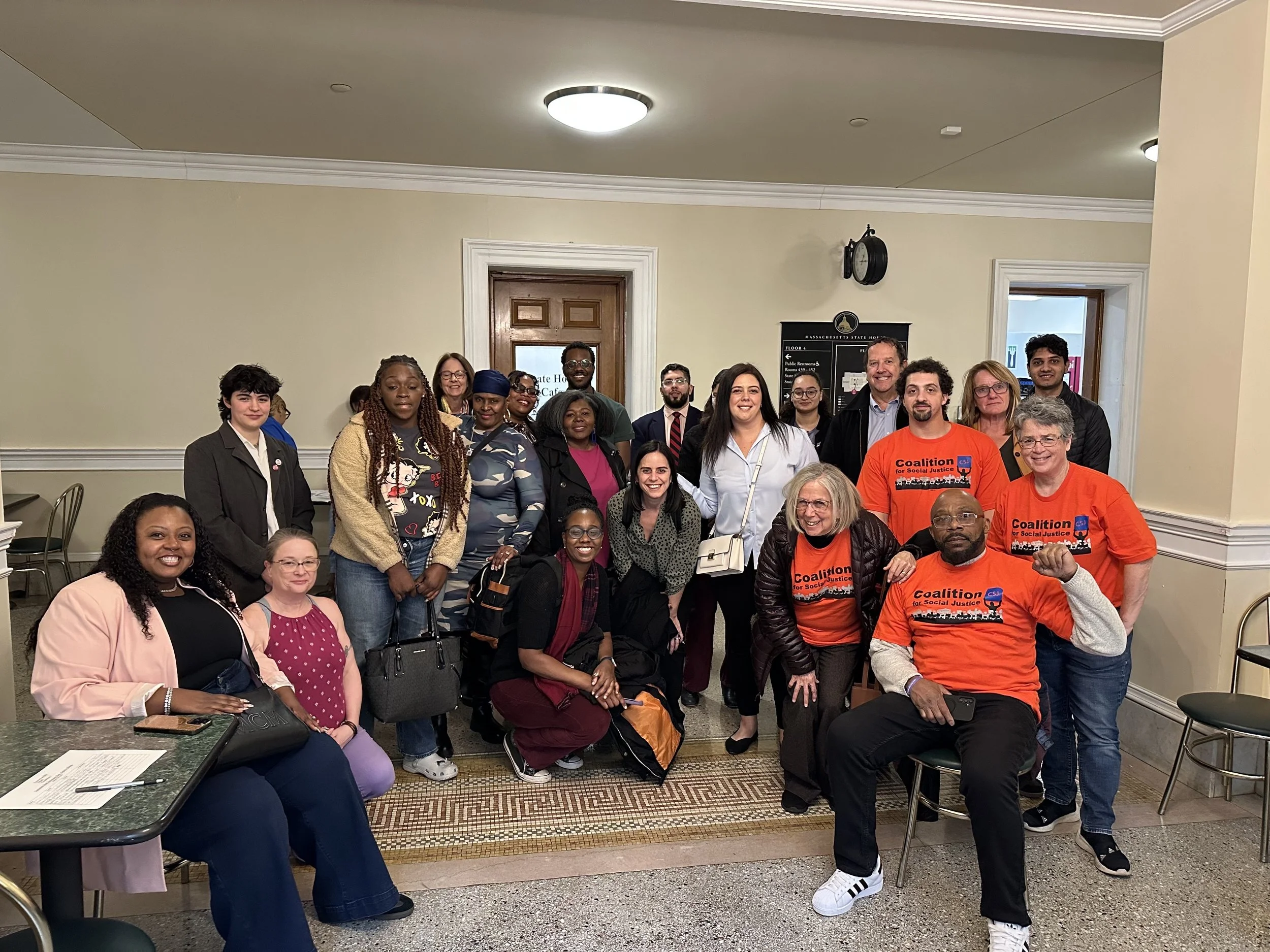A Day in the Life: Advocacy Days as a Mass NOW Co-op
One of the easiest ways anyone can get politically involved is by attending an Advocacy Day at the State House: an event where activists mobilize to divide and conquer the State House, talking to their legislators about their priority Bills, Amendments, or issues. The goal is to visit legislators’ offices and compel them to co-sponsor, support or advance a bill. The more co-sponsors a Bill has, the more likely it is to pass because of the demonstrated broad support. Advocacy Days help connect legislators with their constituents’ real-life stories—showing how these issues impact everyday lives and offering lawmakers a clear way to be part of the solution.
I’ve attended Advocacy Days in the State House’s Great Hall, the Grand Staircase, online or even just met up outside the building. The coalition has prepared all the materials needed: fact sheets (short synopses of each highlighted Bill) to distribute to each Office, a map of the State House, and/or a list of Offices’ room numbers to visit in small groups. Last month, I went to a lobby day co-hosted by a coalition called Keeping Families Connected (KFC), where my group visited each office on the second floor and spoke about slate of Bills that would reform the carceral system– my focus was on #HB2591/SB1720, a Bill to increase visitation in carceral facilities. After asking the receptionists in each office whether anybody is available to speak with us, each member of our small group will give the individual a brief overview on your Bill and explain why they’re important– oftentimes through a personal anecdote. At the KFC Advocacy Day, a member of my group spoke about her experience with arbitrary dress codes in prisons being used to deny visitors’ entry into prisons, an issue she was personally impacted by during her regular visits to her incarcerated husband. She shared about a time when she brought three dresses while visiting to make absolutely sure she’d be able to see her husband– but all three were initially denied. After a lot of hassle, she was eventually allowed to wear one of them– only after the guards had taken a pair of scissors and cut the dress.
It’s stories like those that stick with people. Even if the person you speak to isn’t the legislator themself, don’t worry that your message is lost– sometimes, the staffers are exactly the right people to talk to. Legislators have a lot of things going on, all of the time. They hear from dozens of constituents every day, and that’s a lot more information than one person can fully digest. They rely on their staff to break down the most important things to them, so if you manage to speak to a staff member, like a Legislative Aide, that’s often better than speaking to the legislator themself. In the absence of a meeting, a fact sheet can be left in the mailbox with a handwritten note that reads, ‘Please cosponsor these Bills!’
Fact Sheet Example, Courtesy of Common Start!
Common Start's March 18 Advocacy Day for affordable, high-quality early education and childcare.
This February, I got to experience the behind-the-scenes of this work while planning for Mass NOW’s Menstrual Equity Advocacy Day. A snowstorm moved it online – but we were able to coordinate 42 virtual meetings between attendees and their legislators’ offices for nearly 50 people. Our programming began with our passionate speakers, including five legislators, who spotlighted key parts of each Bill, personal stories, and useful talking points which empowered attendees to be vocal and informed advocates while meeting with their legislators.
Together, we highlighted three bills to increase informed access to menstrual products: the I AM Bill (H.2483/ S.1549), the Public Buildings Bill (H.3318/ S.2156), and the Ingredient Disclosure Bill (H.2375/ S.1483). Our attendees brought their knowledge on the Bills and their personal experiences with menstrual inequity– which so many menstruators can speak to personally– and made their mark: following our Advocacy Day, the number of cosponsors for our menstrual equity agenda skyrocketed to 70! Months later, the momentum still continues– since February, over 215 people have written their legislators in support of these Bills and we’ve mobilized non-menstruating legislators through our upcoming #MenForMenstrualEquity campaign.
Similar to how Mass NOW had speakers in the beginning of our virtual advocacy day, some in-person advocacy days begin with a speech on the steps of the State House. Here, you can hold pre-made signs (courtesy of the organizers) and stand behind the speaker. It makes for a powerful shot: a passionate speaker, a crowd of people behind them holding signs, and the golden dome in the background. The media usually can’t get enough: in my experience, these events are usually filled with big cameras and those fuzzy microphones. Most of the time, though, you’ll meet inside of the State House– advocacy groups love the fourth floor cafe! If they’re especially big, like one I attended for the Massachusetts Commission on the Status of Women, they might be hosted in the Hall of Flags. But wherever you meet, you’re certain to be surrounded by supportive advocates.
Recently, I went to an Advocacy Day for the Bay State Birth Coalition, where we highlighted budget amendments to fund midwifery legislation that had already been passed. The budget was difficult this year, so unfortunately none of the amendments passed, but cosponsorship of Bills is much less tricky– and often highly successful. Before and after an advocacy day, you can check the official Massachusetts State Legislature page and see the number of cosponsors for a Bill literally increase overnight, which is why I consider Advocacy Days to be a particularly effective way to advocate for the causes which matter to you. They’re completely free, take only a few hours of your day (or however long you want them to), are open to anyone, and are a surefire way to connect with other politically involved people.
My hope for you is that you get politically involved in whatever way resonates with you, but I also hope you know that getting involved is far less intimidating than you might think. Sometimes, it’s as simple as just showing up.



